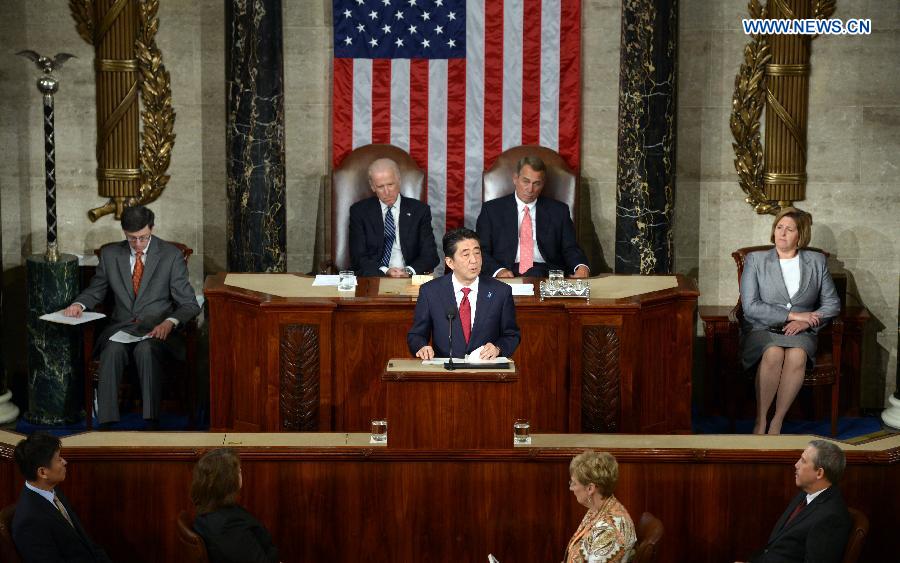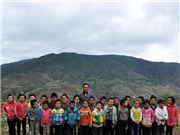

 |
| Japanese Prime Minister Shinzo Abe (C) addresses a joint meeting of Congress on Capitol Hill in Washington D.C., the United States, April 29, 2015. Japanese Prime Minister Shinzo Abe, in the face of a growing chorus of calls for an outright apology for his country's wartime atrocities, told U.S. lawmakers on Wednesday only that he would "uphold" related statements made by his predecessors. (Xinhua/Yin Bogu) |
WASHINGTON, April 29 -- Japanese Prime Minister Shinzo Abe, in the face of a growing chorus of calls for an outright apology for his country's wartime atrocities, told U.S. lawmakers on Wednesday only that he would "uphold" related statements made by his predecessors.
With hundreds of protesters outside the Capitol Hill, as he had seen everywhere since he set foot on U.S. soil on Sunday, the Japanese leader refused to issue a full apology in his speech to a joint session of U.S. Congress, the first by a Japanese premier.
He claimed that Japan started out its path after World War II " bearing in mind feelings of deep remorse over the war."
"Our actions brought suffering to the peoples in Asian countries, we must not avert our eyes from that," he said, adding"I will uphold the views expressed by the previous prime ministers in this regard."
Abe's intransigency over wartime past and his push for Japan to play a greater military role overseas, coupled with unyielding territorial disputes, have put Tokyo on a collision course with China and the Republic of Korea, two neighbors traumatized by Japan's brutal aggression and atrocities, and heightened tensions in the region.
Congressman Steve Israel, who joined the protesters prior to Abe's speech, called for the premier to address Japan's wartime history in his speech so as to "close and heal" wounds.
"If he ignores past atrocities, it will lead to very troubling future," he told reporters. "There are wounds that need to be closed and healed."
"The future can be shaped but history can never be forgotten," he added. "We want him to acknowledge, accept and apologize."
Abe suggested this month that he would not repeat apologies made by his predecessors when he makes a statement in August to mark the70th anniversary of WWII's end.
Terms such as "heartfelt apology" and "colonial rule and aggression" were included in the statements issued by then Prime Minister Tomiichi Murayama in 1995 and Prime Minister Junichiro Koizumi in 2005 to mark the war's 50th and 60th anniversaries.
Ahead of Abe's visit, Koreans had lobbied for an apology, in particular for the issue of some 200,000 women forced into sex slaves for Japanese military during the war now referred to as " comfort women."
Also before Abe's visit, Congressman Michael Honda sent a letter signed by 25 House of Representatives members to the Japanese ambassador urging the premier to "lay the foundation for healing and humble reconciliation by addressing the historical issues."
The Obama administration had also called on Japan to handle its wartime history in a way that promotes "healing and reconciliation."
Abe told U.S. lawmakers that he visited the World War II memorial in Washington D.C. before addressing them.
"With deep repentance in my heart, I stood there in silent prayers for some time," he claimed.
He did not refer to the issue of "comfort women," saying only that "Armed conflicts have always made women suffer the most. In our age, we must realize the kind of world where finally women are free from human-rights abuses."
Confronted with a question on Tuesday at the White House about whether he would make an apology for Japan's wartime history, including the "comfort women" issue, Abe simply echoed the words he used a year earlier.
"I am deeply pained to think about the comfort women who experienced immeasurable pain and suffering as a result of victimization due to human trafficking," he told a joint press conference with President Barack Obama.
His reference to human trafficking this time was implying Japanese military's no-sin in the matter.
Congressman Honda used "shocking" and "shameful" to describe his disgust toward Abe's continuing evasion of his government's responsibility.
"Today's refusal to squarely face history is an insult to the spirit of the 200,000 girls and women from the Asia-Pacific who suffered during World War II," he said. "This is unacceptable."
Congresswoman Judy Chu echoed the sentiment, accusing Abe of ignoring "Japan's responsibility for this particularly troubling and painful chapter."
"The prime minister said that Japan's eyes are always on the road ahead, but without responsibility and remorse, it is impossible to move forward," she added.
Day|Week

 Tsinghua junior makes over 10,000 yuan a day by selling alumnae's used quilts
Tsinghua junior makes over 10,000 yuan a day by selling alumnae's used quilts Graduation photos of students from Zhongnan University
Graduation photos of students from Zhongnan University A school with only one teacher in deep mountains
A school with only one teacher in deep mountains Glimpse of cultural heritage "Xilankapu"
Glimpse of cultural heritage "Xilankapu" Homemade cured hams in SW China
Homemade cured hams in SW China Breathtaking buildings of W. Sichuan Plateau
Breathtaking buildings of W. Sichuan Plateau Graduation photos of "legal beauties"
Graduation photos of "legal beauties" Top 10 most expensive restaurants in Beijing in 2015
Top 10 most expensive restaurants in Beijing in 2015